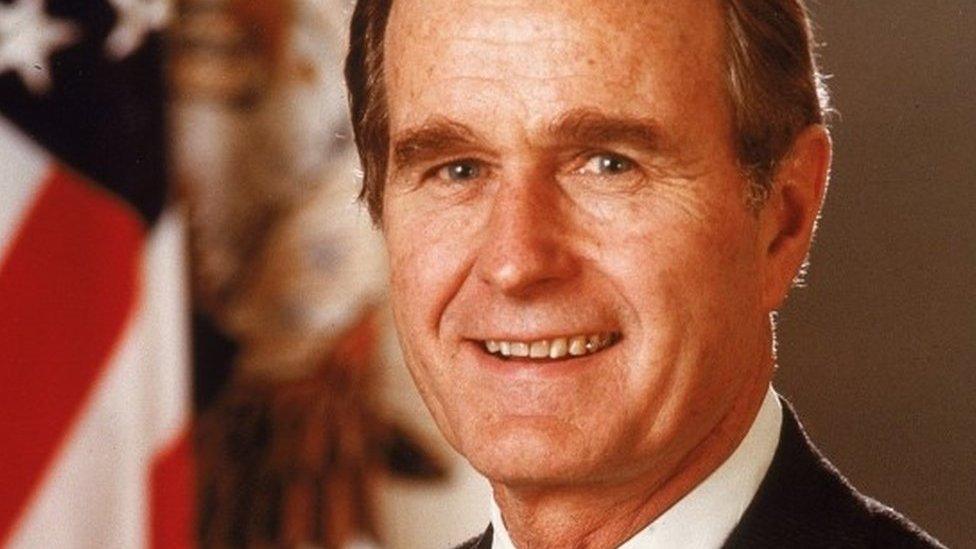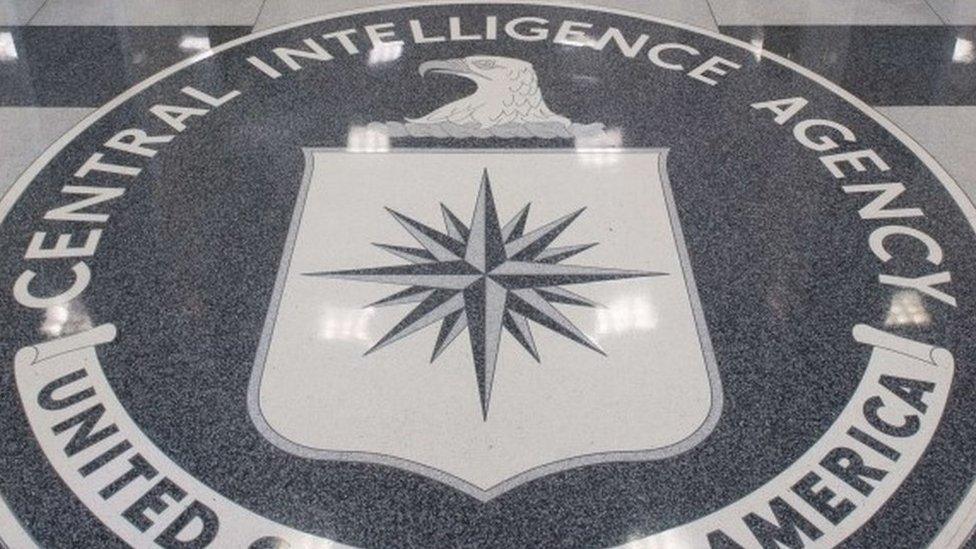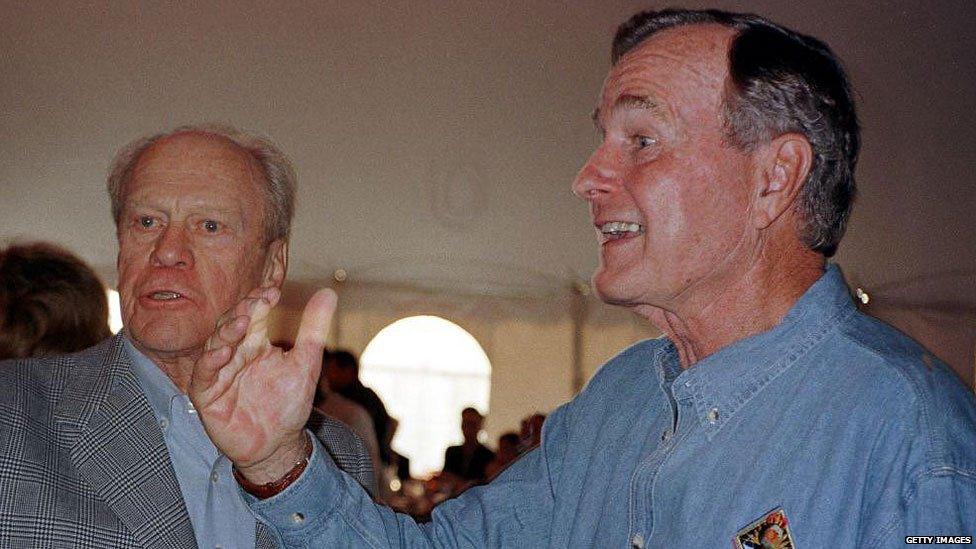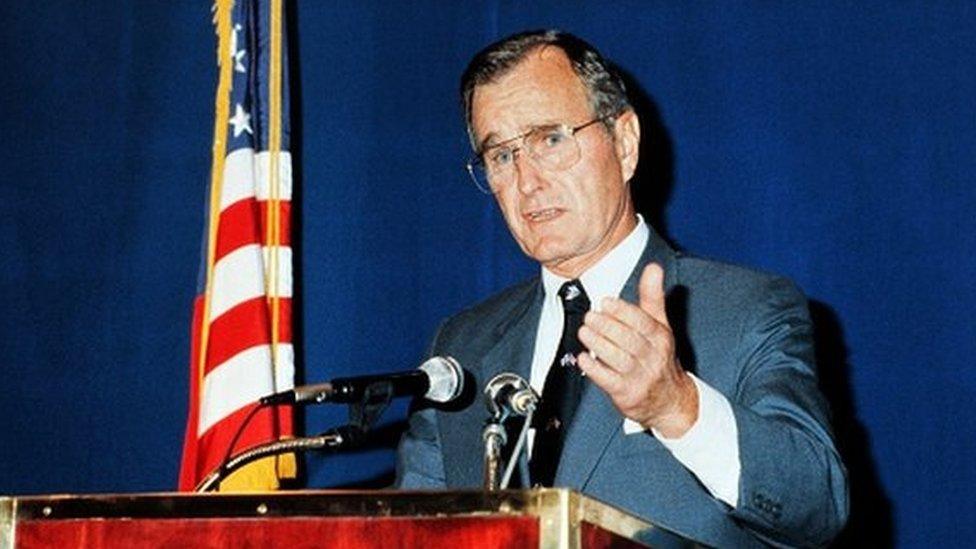George HW Bush: The making of a president
- Published

Few men have arrived at the White House with a longer CV than George HW Bush. Besides his wartime exploits, he ran an oil company and the CIA and had been US ambassador to the United Nations as well as serving as US vice-president for eight years.
It was in 1948 when George Herbert Walker Bush, newly graduated from Yale and the scion of an eastern establishment family, rode into Odessa, Texas, in a red Studebaker car to start a new career as an oilman.
Initially, he worked as a salesman for Dresser Industries, a company which manufactured oil drilling equipment and which was owned by a friend of Bush's father.
The years following World War II were a boom time for both the US economy and the Texas oil industry and, despite slumming it for a time in a shotgun shack, Bush and his family soon found their feet, developing a taste for Texan food and country and western music.
Within three years, he had founded his own firm, the Bush-Overbey Oil Development Company, the first of a number of highly successful drilling ventures.
The transition from wealthy Connecticut boy to wealthy Texan had been accomplished. Now Bush looked to secure himself a political career.
In 1964 he ran, unsuccessfully, for a US Senate seat in Texas, which was then solidly Democratic. At the time, Bush was a radical Republican who supported the right-wing firebrand and presidential candidate Barry Goldwater, denounced civil rights and backed military action in Cuba.
Two years later, running on decidedly more moderate policies, he was elected to the US House of Representatives as member for Texas's 7th District.

He was director of the CIA for two years
That election saw Bush steer away from ideology and, as he would do in every campaign from then on, talk mainly about his personal qualities and not, as he later called it, "the vision thing". At the time, he told one reporter: "Labels are for cans."
Bush's progress in Congress was rapid and he soon found himself on the influential Ways and Means Committee, which oversees taxes.
Although he was again defeated for one of the Texas seats in the Senate in 1970, his closeness to then-President Richard Nixon soon secured him high office.
In 1971, Bush became US ambassador to the United Nations, where he was involved in Nixon's policy to build bridges to China and also extricate the US from Vietnam.
And 1973 saw Bush take over from Senator Bob Dole as chairman of the Republican National Committee. It was the time of Watergate and, as Richard Nixon's hold on the White House grew weaker, George Bush's position as a leading member of his party became ever stronger.

Bush was Republican National Chairman when Gerald Ford was president
As the Watergate crisis reached its climax, Bush wrote to Nixon, telling him bluntly: "It is my considered judgement that you should now resign."
The following day, 8 August 1974, Nixon did just that. George HW Bush had proved a decisive player in the greatest downfall in US political history.
Nixon's successor, Gerald Ford, rewarded Bush with two plum jobs. In 1974, when the US and China had no official diplomatic ties, he was appointed chief of the US Liaison Office in Beijing, where he co-ordinated a renewing of relations between the US and China.
Two years later he became director of the Central Intelligence Agency. At the time, the CIA was being battered by revelations of illegal covert operations, assassination attempts on foreign leaders such as Fidel Castro, and the secret testing of LSD on unsuspecting subjects.
Many in the agency were concerned that Bush, a career politician with one eye still on the White House, might use his position for partisan ends.
However, in his short time in the role he gave the CIA a renewed focus, and emphasised the growing strength of the Soviet military. It would be a theme which would dominate his time as vice-president and president.
Ousted from the job at the CIA by a Democrat, Jimmy Carter, Bush was now able to devote himself to running for the highest office.
Within three years he was on the campaign trail, denouncing Mr Carter for cosying-up to the Soviets.

Vice-President George Bush in Helsinki in 1983
However, it was not the pragmatic liberal George Bush - the man, according to the press, with "the biggest resume in America" - who won the day in 1980, but the relatively inexperienced conservative ideologue, Ronald Reagan.
During the Republican primaries, the two men viewed one another with suspicion.
Reagan, who privately questioned Bush's ability to "stand up to the pressure of being president", initially asked former President Ford to be his running mate and chose Bush only after Ford declined the offer.
For his part, Bush denounced Reagan's policy of tax cuts combined with increased military expenditure as "voodoo economics". And he was uncomfortable with Reagan's social policies, especially his anti-abortion beliefs.
In the end, though, Bush signed up "wholeheartedly", as he diplomatically put it, to the Reagan ticket, spending eight frustrating years a heartbeat away from the presidency.